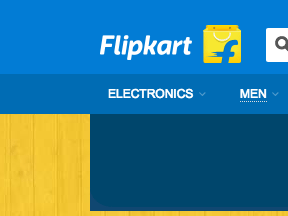
Walmart’s recent acquisition of a majority stake in Flipkart, the giant India-based marketplace, will likely reshape ecommerce in that country.
The Indian ecommerce market is growing quickly thanks to smartphone penetration and fast internet. Overall ecommerce revenue in India is projected to reach $64 billion by 2020 from $38.5 billion in 2017, an increase of roughly 66 percent. That’s according to India Brand Equity Foundation, a partnership trust of the Indian government and private companies. IBEF projects ecommerce sales in India will surpass the U.S. by 2034, to become the second largest ecommerce market in the world. (U.S. retail ecommerce sales in 2017, by comparison, were roughly $409 billion.)
Apart from fashion and consumer electronics, segments experiencing rapid online sales growth in India include furniture, groceries, personal and beauty products, and food delivery. The increasing number of millennials — consumers reaching adulthood in the 2000s — rapid urbanization, and a better economy are also crucial factors influencing this trend.
Enter Walmart
Walmart’s recent acquisition (for roughly $16 billion) of 77 percent of Flipkart, the giant Indian marketplace, will likely benefit Flipkart and consumers. Flipkart lacks the expertise in logistics and supply chain management, which is a Walmart strength.
Walmart, on the other hand, will benefit from India’s rapid ecommerce growth and Flipkart’s marketplace model. For Indian consumers, all of this will likely result in lower prices and more products.
India’s foreign direct investment regulations won’t allow the American retailer to sell brands from other countries. Instead, Walmart will have to sell the items procured locally.
Amazon is the second largest ecommerce company in India with 31 percent market share. Flipkart, combined with its fashion subsidiaries Myntra and Jabong, has 39.5 percent share. Amazon has more products listed on its platform and more exclusive offers. It also offers better pricing.
To compete with Amazon, which has pledged to invest $5 billion in its Indian operations, Walmart will likely develop a reliable storage, inventory, and logistics network in the country. The improved supply chain should generate more job opportunities and increased access to cold-storage technology for groceries, both of which support farmers and small grocery stores. Thus the deal could provide an additional boost to Indian agriculture and infrastructure.
The deal is also a vote of confidence in the Indian tech startup ecosystem — Flipkart was launched in 2007 by two ex-Amazon employees — proving that India can attract foreign investors.
American Duopoly?
The deal, however, is not universally supported in India. Protestors include nationalist political factions, small trader’s unions, worker’s unions, and farmers. An example is Swadeshi Jagran Manch, a nationalist group linked to Rashtriya Swayamsevak Sangh, the ideological parent of Prime Minister Narendra Modi’s party. The protesters are calling the deal a move against India’s interests as it will lead to a sort of duopoly of two American companies, Amazon and Walmart.
More than 100 groups of small traders, farmers, and workers have come together to oppose the deal. According to protesters, the predatory pricing and steep discount model for which Walmart is famous will eventually force smaller traders and local retailers out of business. Another concern is increased unemployment. Protestors fear that the collapse of smaller retailers in the country will create fewer net jobs.
However, Walmart quickly dismissed these assertions. In fact, Walmart India Chief Corporate Affairs Officer Rajneesh Kumar said that the Walmart-Flipkart alliance will help modernize the small grocery shops — “Kirana stores” — and thus create job opportunities.
“We [Walmart] have been running cash-and-carry business in India for almost a decade now, helping small Kirana stores succeed and become modern. We are sourcing locally, with more than 95 percent of our merchandise coming from within the country, including from thousands of small farmers, small suppliers, and women-owned businesses,” he added.
Regardless, the deal has put the Modi government in a tight spot politically.
Reshaping Ecommerce
In short, Indian consumers and the Indian tech ecosystem are excited about the deal. But small traders, farmers, and worker unions are strongly opposed. In time, the deal will reshape ecommerce in India for the good despite the nationalist rhetoric.




